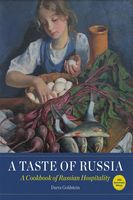🌷 Spring savings – save 25% on ckbk Premium Membership with code SPRING25
Easter
Paskha
Published 1983
By far the most important holiday in the Russian Orthodox Church is Easter, a time of great feasting and rejoicing, falling as it does after the six-week Lenten fast, when no meat or dairy products are allowed—a considerable deprivation during a season when vegetables are often scarce. During the week preceding Easter, known as Passion Week (strastnaya nedelya), the foods for the feast are prepared. One can only imagine the extremes of temptation these holiday cooks are subjected to, preparing delicacies from the finest available ingredients after six long weeks of denial. Finally, on Easter Eve, the table is set with an abundant spread, featuring the traditional paskha, kulich and decorated eggs. This custom of decorating eggs can be traced back to the pagan spring festivals, when eggs were painted with bright colors to symbolize the blossoming of the plant world. Today egg painting is considered an art form, especially in Ukraine, where the intricate designs are applied by a complex process of dipping in beeswax and dye baths. These spectacular Ukrainian eggs are known as pysanky.
Become a Premium Member to access this page
Unlimited, ad-free access to hundreds of the world’s best cookbooks
Over 150,000 recipes with thousands more added every month
Recommended by leading chefs and food writers
Powerful search filters to match your tastes
Create collections and add reviews or private notes to any recipe
Swipe to browse each cookbook from cover-to-cover
Manage your subscription via the My Membership page
Part of
Advertisement
Related Recipes
-
-
-
-
Related Reference
-
-
-
-
Advertisement



